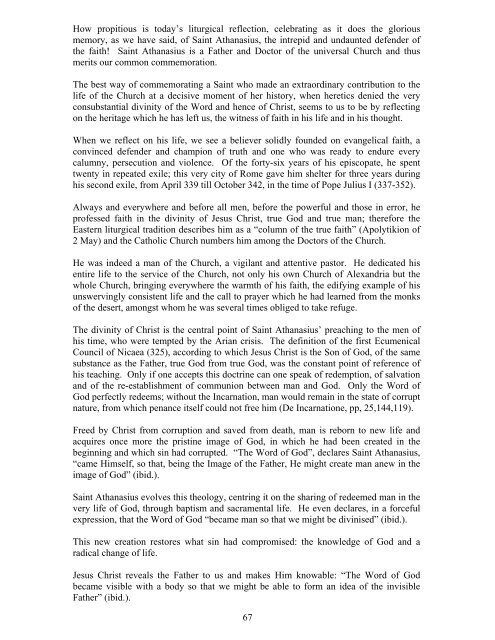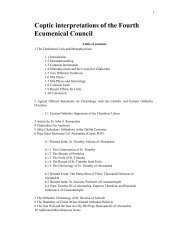Coptic Church & Ecumenical Movement - Saint Mina Coptic ...
Coptic Church & Ecumenical Movement - Saint Mina Coptic ...
Coptic Church & Ecumenical Movement - Saint Mina Coptic ...
Create successful ePaper yourself
Turn your PDF publications into a flip-book with our unique Google optimized e-Paper software.
How propitious is today’s liturgical reflection, celebrating as it does the glorious<br />
memory, as we have said, of <strong>Saint</strong> Athanasius, the intrepid and undaunted defender of<br />
the faith! <strong>Saint</strong> Athanasius is a Father and Doctor of the universal <strong>Church</strong> and thus<br />
merits our common commemoration.<br />
The best way of commemorating a <strong>Saint</strong> who made an extraordinary contribution to the<br />
life of the <strong>Church</strong> at a decisive moment of her history, when heretics denied the very<br />
consubstantial divinity of the Word and hence of Christ, seems to us to be by reflecting<br />
on the heritage which he has left us, the witness of faith in his life and in his thought.<br />
When we reflect on his life, we see a believer solidly founded on evangelical faith, a<br />
convinced defender and champion of truth and one who was ready to endure every<br />
calumny, persecution and violence. Of the forty-six years of his episcopate, he spent<br />
twenty in repeated exile; this very city of Rome gave him shelter for three years during<br />
his second exile, from April 339 till October 342, in the time of Pope Julius I (337-352).<br />
Always and everywhere and before all men, before the powerful and those in error, he<br />
professed faith in the divinity of Jesus Christ, true God and true man; therefore the<br />
Eastern liturgical tradition describes him as a “column of the true faith” (Apolytikion of<br />
2 May) and the Catholic <strong>Church</strong> numbers him among the Doctors of the <strong>Church</strong>.<br />
He was indeed a man of the <strong>Church</strong>, a vigilant and attentive pastor. He dedicated his<br />
entire life to the service of the <strong>Church</strong>, not only his own <strong>Church</strong> of Alexandria but the<br />
whole <strong>Church</strong>, bringing everywhere the warmth of his faith, the edifying example of his<br />
unswervingly consistent life and the call to prayer which he had learned from the monks<br />
of the desert, amongst whom he was several times obliged to take refuge.<br />
The divinity of Christ is the central point of <strong>Saint</strong> Athanasius’ preaching to the men of<br />
his time, who were tempted by the Arian crisis. The definition of the first <strong>Ecumenical</strong><br />
Council of Nicaea (325), according to which Jesus Christ is the Son of God, of the same<br />
substance as the Father, true God from true God, was the constant point of reference of<br />
his teaching. Only if one accepts this doctrine can one speak of redemption, of salvation<br />
and of the re-establishment of communion between man and God. Only the Word of<br />
God perfectly redeems; without the Incarnation, man would remain in the state of corrupt<br />
nature, from which penance itself could not free him (De Incarnatione, pp, 25,144,119).<br />
Freed by Christ from corruption and saved from death, man is reborn to new life and<br />
acquires once more the pristine image of God, in which he had been created in the<br />
beginning and which sin had corrupted. “The Word of God”, declares <strong>Saint</strong> Athanasius,<br />
“came Himself, so that, being the Image of the Father, He might create man anew in the<br />
image of God” (ibid.).<br />
<strong>Saint</strong> Athanasius evolves this theology, centring it on the sharing of redeemed man in the<br />
very life of God, through baptism and sacramental life. He even declares, in a forceful<br />
expression, that the Word of God “became man so that we might be divinised” (ibid.).<br />
This new creation restores what sin had compromised: the knowledge of God and a<br />
radical change of life.<br />
Jesus Christ reveals the Father to us and makes Him knowable: “The Word of God<br />
became visible with a body so that we might be able to form an idea of the invisible<br />
Father” (ibid.).<br />
67








